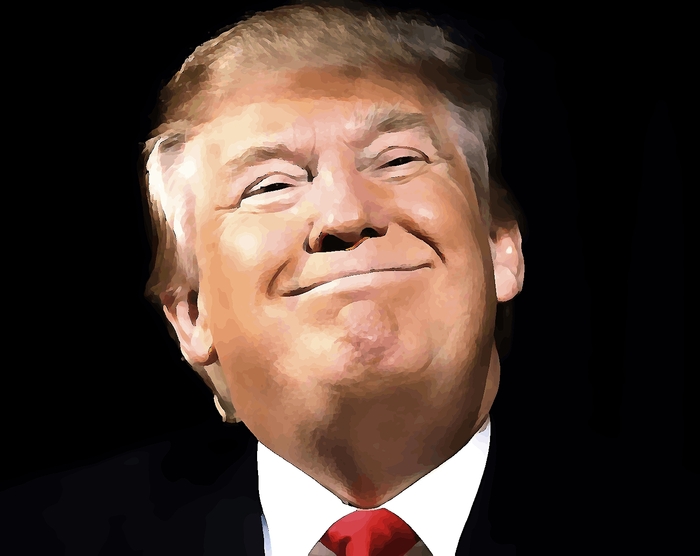
This rewrite of the 25-year-old North American Free Trade Agreement, which allows Trump to deliver on a signature campaign promise from 2016, is one of the most significant trade votes in a generation. It passed with overwhelming bipartisan support from a coalition of strange bedfellows, including the AFL-CIO and the U.S. Chamber of Commerce. Final passage came a day after Trump signed a partial economic deal with China, another political victory for a White House that's eager to defuse trade tensions in an election year.
The subsequent reading of the two articles of impeachment and the swearing-in of the senators as jurors soon overshadowed these hard-fought triumphs for Trump. But the trade vote nevertheless gives cover for lawmakers in both parties to reassure constituents back home that they're getting results, even amid contentious deliberations over whether the president abused the power of his office to coerce a foreign government to boost his reelection prospects by announcing an investigation of Democratic challenger Joe Biden.
Trump has boasted that the specter of impeachment, and the desire of Democrats not to look like they're doing nothing, got this deal across the finish line. Last month, one day after voting almost entirely on party lines to impeach Trump, the House also passed the U.S.-Mexico-Canada Agreement on a lopsided vote of 385-41. With their eyes on the fall elections, Speaker Nancy Pelosi, D-Calif., and Senate Majority Leader Mitch McConnell, R-Ky., have separately pointed to the USMCA as proof that their side is focused on the pocketbook issues that voters care most about.
Eight Senate Democrats and Bernie Sanders voted against the deal. But only one Republican broke with the president: Sen. Pat Toomey, R-Pa., perhaps the most outspoken advocate for free trade in Congress. Toomey unsuccessfully raised procedural concerns about the USMCA on the Senate floor before the vote.
"I was very disturbed to see a new trade agreement that's designed in part to diminish trade - very much the wrong direction," he explained afterward in an interview. "I felt it was important to make a stand and make the case that this certainly shouldn't be a template for future agreements."
Toomey called me as he drove home to Pennsylvania for the Martin Luther King Jr. holiday weekend at the end of one of the most surreal days of his nine years in the Senate. "It's just very strange," Toomey said. "There were moments that seemed surreal to me today in the Senate. It's just such an unusual moment." He has complained that Republicans got "rolled" because the Trump administration made too many concessions to Democrats in a desire to get something done. He said "the worst provisions" in the new deal relate to automobiles. For example, there's now a requirement that at least 30% of cars - and 40% by 2023 - must be made by workers who earn at least $16 an hour.
This will raise wages in Mexico, but Toomey said it will also raise prices to buy lower-end small cars that are assembled south of the border. The deal also sunsets after 16 years, meaning that the three countries will need to go through another renegotiation process, which Toomey fears will chill business investment by introducing a cloud of uncertainty about the future terms of trade.
The USMCA was initially signed a year ago by Trump, but the requirement that it must first be ratified by the House gave Pelosi leverage to demand changes and concessions, including higher labor standards in Mexico, higher environmental standards and stronger enforcement mechanisms. A team of nine House Democrats worked with U.S. Trade Representative Robert Lighthizer and his staff for months to reach a compromise.
At Pelosi's behest, the renegotiated deal also killed a provision pushed by pharmaceutical companies that would have guaranteed them 10 years of market exclusivity for biologics, a class of drugs that are especially costly.
Toomey isn't as flashy about it as some of his hardline colleagues who love to go on television, but the vote underscored his record as one of the most reliable fiscal conservatives in Congress. The 58-year-old served in the House for three terms until 2004. After narrowly losing a primary challenge that year against then-Republican Sen. Arlen Specter, Toomey served as president of the Club for Growth, the conservative group created to support open markets and oppose regulations.
As Toomey geared up for a rematch against Specter in 2010, the incumbent changed parties after being promised Barack Obama's endorsement. But Specter lost in the Democratic primary to Joe Sestak. Toomey then won the seat that fall. He got narrowly reelected in one of the marquee races of 2016, as Trump became the first Republican presidential candidate to carry the Keystone State since 1988.
Toomey has picked his fights carefully in the Trump era. All told, he's voted with the president's position 83% of the time in the current Congress, according to the running tabulation by FiveThirtyEight. But he's twice supported efforts to overturn Trump's declaration of a national emergency for border wall funding, and he backed the resolution of disapproval last February for withdrawing U.S. forces from Syria.
Since Trump took office, the junior senator has voted against all the major omnibus spending bills and the bloated farm bill. He's opposed raising the debt ceiling and joined small groups of senators in voting against hurricane relief packages that weren't paid for with spending cuts elsewhere. Many Republicans insisted on this throughout Obama's presidency but have reversed their approach under Trump. Toomey has stayed consistent on these kinds of votes.
Throughout, trade has remained Toomey's signature issue. "I've been very, very candid with everyone in the administration - from the president to the vice president and the trade representative - they know exactly where I stand," he told me. "I tried hard to persuade them of my point of view. I obviously failed, but to their credit, they always heard me out."
Trump campaigned four years ago as a protectionist, rejecting decades of Republican orthodoxy. The president's support for old-fashioned industrial policies and a reflexive inclination to impose tariffs on other countries - something he threatened to do against a trio of European leaders just last week if they didn't cave to his demands on Iran - appear to be among his longest and most deeply-held beliefs.
But Toomey said he believes "there's generally still very broad support" for the concept of free trade in his party. "If you asked the Republican senators if they consider themselves 'free traders,' I think the vast majority would say they do, but I acknowledge that there has always been a protectionist element," he said. "There are protectionists among Republicans who would like to further restrict trade, and I do think it's important for free traders to push back on that."
Sign up for the daily JWR update. It's free. Just click here.
(COMMENT, BELOW)


 Contact The Editor
Contact The Editor
 Articles By This Author
Articles By This Author